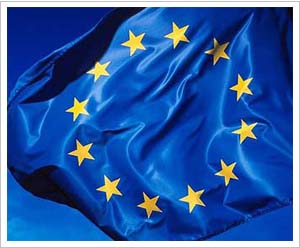EU monitors tense peace one year after Russia-Georgia war
 Tbilisi - Georgian soldiers, stationed at a checkpoint near the South Ossetian town of Akhalgori, watched warily as a Russian military helicopter took off from the opposite side of the valley.
Tbilisi - Georgian soldiers, stationed at a checkpoint near the South Ossetian town of Akhalgori, watched warily as a Russian military helicopter took off from the opposite side of the valley.
Blue-vested European Union (EU) monitors followed the helicopter through their binoculars, as it mapped out the edges of South Ossetian territory.
The EU provides the only outside observers to the tense stand-off after Russia's war with Georgia over South Ossetia and Abkhazia a year ago and since Russia vetoed the renewal of United Nations and Organization for Security and Economic Cooperation in Europe missions to the region.
Barred from the breakaway territories, the unarmed monitors patrol the Tbilisi-controlled side, compiling data from Georgian police and army checkpoints whilst establishing tentative contact with the guards operating on the other side.
This task has become easier at the South Ossetian crossings, where disciplined Russian border guards have taken over from local militia.
Previously, a key aspect of the European bridge-building work involved establishing whether the Ossetian guards were drunk, before attempting to engage them in conversation.
In Abkhazia, to the west, the lines of command remain less clear, said Simeon Ivanov at the field office of the EU Monitoring Mission (EUMM) in the town of Zugdidi.
The Russian forces had not yet taken charge of the checkpoints, where politically charged incidents still occurred, the Bulgarian policeman said.
On one occasion, weapons fired in celebration at the birth of a child were misconstrued as an act of aggression, until the European monitors defused the situation.
Hansjoerg Haber runs the EU mission from a former Soviet government guesthouse in Tbilisi, an austere building whose vaults house the remnants of a sauna complex.
The German diplomat said it was crucial to insist that the EUMM mandate included Abkhazia and South Ossetia - even if access remained blocked for the foreseeable future.
"What is important for the Georgians ... is that the EU does not diplomatically recognize the two entities, and this keeps the Georgian question open," Haber told the German Press Agency dpa.
A further element of the EU mission is to provide security for civilians living in the disputed regions, including those forced out of their homes by the conflict.
An estimated 37,000 Georgians are still displaced as a result of last summer's war, on top of 247,000 internally displaced people from previous conflicts.
Many of these are ethnic Georgians from South Ossetia, including residents from the town of Akhalgori who now live in the newly constructed Tserovani settlement north of Tbilisi.
The residents speak well of Georgian President Mikheil Saakashvili, whose hillside summer residence overlooks their new homes.
Cracks are now appearing in the floors of their whitewashed bungalows, 2,000 of which were built within eight weeks. The inhabitants of Tserovani survive on monthly government handouts of 28 laris (17 dollars).
A Tserovani shop owner, who declined to be named, regularly visits Akhalgori where his house stands, empty. But he could not live there now, he said, and it would not be safe to work his fields.
"The Russians behave normally towards those of us who come and go," the 44-year-old told German Press Agency dpa.
"The problem is the South Ossetian militias who are still there." The militias, he said, were often drunk and behaved unpredictably.
In Tbilisi, Zugdidi and Tserovani, two big questions remain: who started last summer's conflict, and how likely is a renewed escalation?
Answers to the first question are a moot point, as Georgia and Russia both claim they were defending themselves against unprovoked aggression.
On the second question, the voices are more measured.
Deputy Defence Minister Georgi Muchaidze said the EU's presence in the region greatly reduced the danger of renewed conflict, but warned, "Obviously, nobody can say that there is no risk."
Opposition leader Irakli Alasania had a more shrewd analysis.
"The status quo fits the Russian interests in Georgia," the former diplomat said.
Alasania said it suited Russia for Georgia to be led by an internationally discredited president who faced animosity at home, while they established their military presence in the breakaway territories.
This contrasts with the recent image of Saakashvili, bolstered by the visit of US Vice President Joe Biden who pledged US support during a banquet in the Georgian capital.
Despite Russian disregard for the terms of the European-brokered peace deal, Haber said Russia and Georgia had retreated from the belligerence the EU mission had encountered in October.
"Both thought that the other side had not reached its goals and that there would be a renewed outbreak of the conflict," the EU mission chief said, adding, "That has not happened." (dpa)